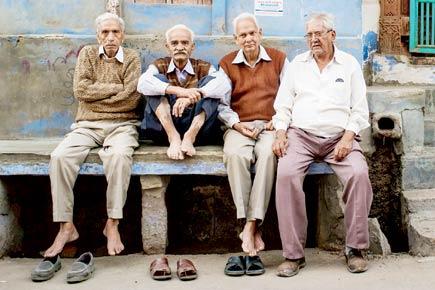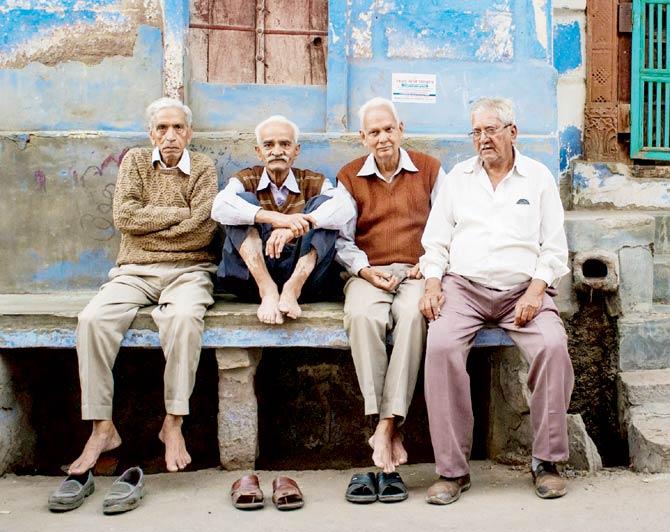Very close to where I now live outside Dehradun is a construction site for an enclave for “senior living”

 Very close to where I now live outside Dehradun is a construction site for an enclave for “senior living”. Here, people of similar interests and it has to be said, similar wallet sizes, hope to live out their last days in comfort and some spectacular mountain views. The people who will live here want to do so on their own terms, reducing the burden and perhaps the guilt quotient for their children and their heirs.
Very close to where I now live outside Dehradun is a construction site for an enclave for “senior living”. Here, people of similar interests and it has to be said, similar wallet sizes, hope to live out their last days in comfort and some spectacular mountain views. The people who will live here want to do so on their own terms, reducing the burden and perhaps the guilt quotient for their children and their heirs.
But in today’s India, this is still a brave decision and an unusual decision. We are still lost in that space between familial duty, nuclear families and joint family mindsets. Looking after your elderly parents was automatic even four decades ago; now it can be a choice, a chore or a catastrophe.

In today’s India, we are still lost in that space between familial duty, nuclear families and joint family mindsets. Looking after your elderly parents was automatic even four decades ago; now it can be a choice, a chore or a catastrophe. Representation pic/Thinkstock
For years, we Indians looked down on “the West” where people “abandoned” their parents to homes, or so it seemed to us. Our “culture” was better, superior and everyone was looked after. But even as we said it, some of us knew how much of that was a lie, a comfortable shibboleth to assuage a collective guilt. Not every family was equally kind; not every elderly person lived with dignity.
Some got shunted from relative to relative. Some were looked after as long as there was money. Some were dragged out of their comfort zones to live with offspring in unfamiliar places and left with no one to talk to, who understood them. The tyranny of being restricted to one room in your child’s house where everyone is too busy to spend more than 10 minutes with you is perhaps as bad as living in an old age home looked after by strangers.
It is only in the last decade that I have heard older people discussing the importance of daughters, for instance, moving away from the usual love for sons towards perhaps another gender prejudice. Together with those much-wanted sons, the ones people have happily killed their daughters for, comes that impossible daughter-in-law. The Hindi film Baghban may have been too melodramatic for some, but it touched all the right chords for many senior citizens.
Sadly, though there is no guarantee that your daughter will look after you well or equally that your son will not. Besides, the responsibility may fall on a niece or nephew or some other family member.
In my 50s now, I know of no one who is not confronting the same problems about responsibility, parents and elderly relatives. And first world or third world, our supreme culture or any other, the conflicts remain the same and the solutions as elusive. Guilt is a constant factor, in whichever continent and whichever sort of home, as anyone who has read Atul Gawande’s Being Mortal will know. That excellent book is the best eye-opener for anyone who has shied away from the issues that old age inevitably carry with them and we are not talking only about health.
The switch from dependent to care-giver is a tough one and has to be dealt with sensitively, not just practically or pragmatically. Love by itself is not enough and duty can be a real dampener and let us not fool ourselves that all Indian parents have been perfect towards their children either. There is no one answer, there is no one solution. In India, we are lucky now to the extent that domestic help is still relatively cheaper than the developed world. But this will not last for long. By the time people my age need care and help, India will be a changed society and one which we will not be used to. It may well be a society closer to “the West” than the India of our grandparents.
And I fear for my generation, that we have not thought enough about our own futures even as we grapple with those of our parents. Do not go gentle into that good night, said that matchless poet, Dylan Thomas, rage, rage against the dying of the light. But the older you get, the more you understand that it is not the night or the dying light that you have to worry about. It is that the years just before must be gentle.
Ranjona Banerji is a senior journalist. You can follow her on Twitter @ranjona
 Subscribe today by clicking the link and stay updated with the latest news!" Click here!
Subscribe today by clicking the link and stay updated with the latest news!" Click here!







